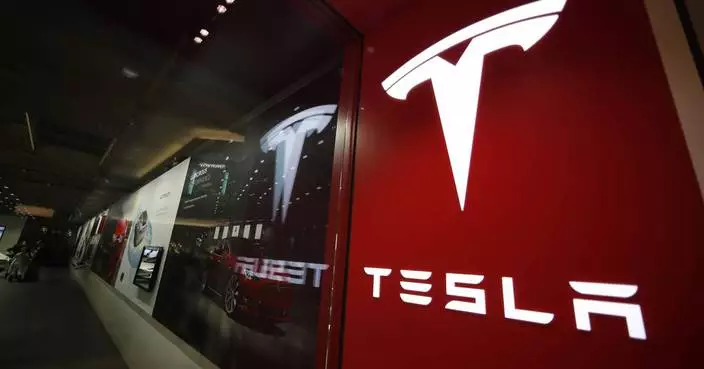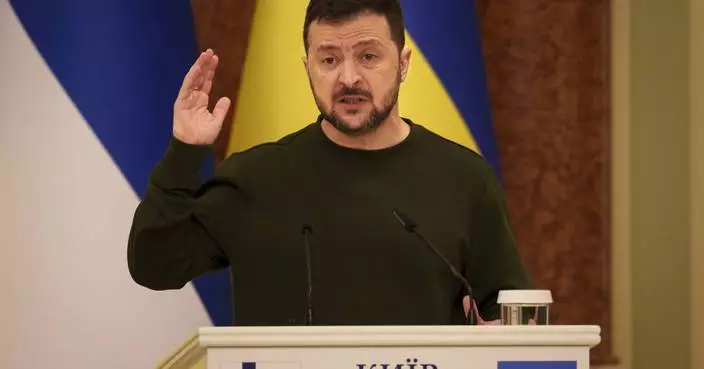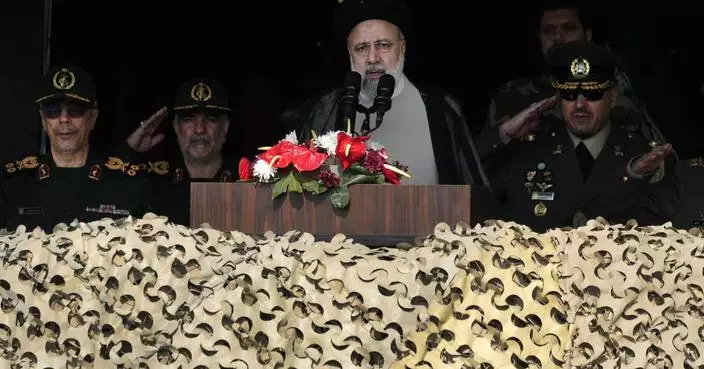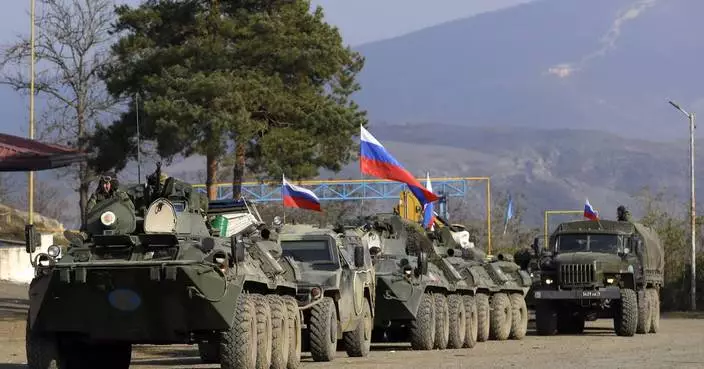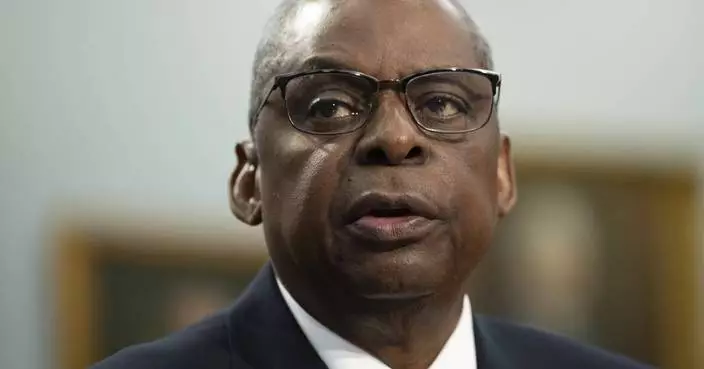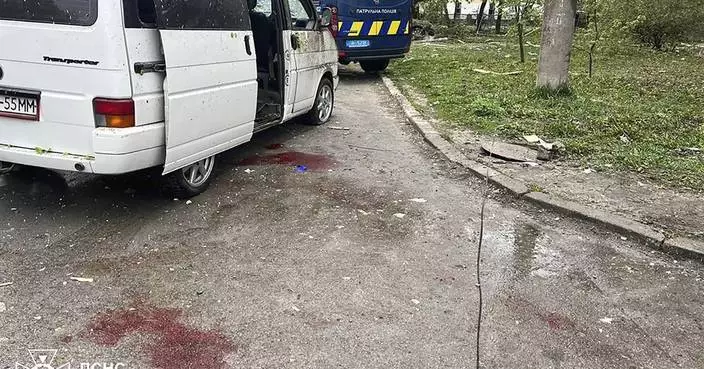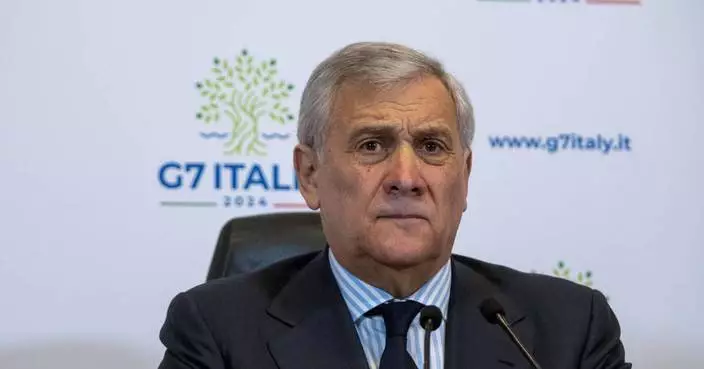Since a former Russian double agent and his daughter were poisoned in Britain a week ago, suspicions about Russia's possible handiwork have run high — except in major Russian news outlets, where fingers point in the other direction.
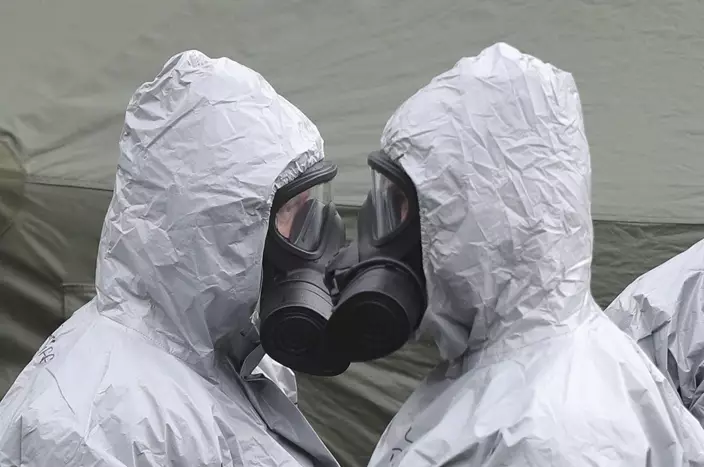
Military personnel in College Street Car Park in Salisbury, Sunday March 11, 2018, as police and members of the armed forces probe the suspected nerve agent attack on Russian double agent Sergei Skripal, which took place on Sunday March 4. (Andrew Matthews/PA via AP)
Sergei Skripal, a former officer in Russia's military intelligence service GRU who was convicted in Russia of spying for Britain, and his adult daughter were found comatose on March 4 in the English town of Salisbury, where he lived after being freed in a 2010 spy swap.
Click to Gallery
Since a former Russian double agent and his daughter were poisoned in Britain a week ago, suspicions about Russia's possible handiwork have run high — except in major Russian news outlets, where fingers point in the other direction.
Sergei Skripal, a former officer in Russia's military intelligence service GRU who was convicted in Russia of spying for Britain, and his adult daughter were found comatose on March 4 in the English town of Salisbury, where he lived after being freed in a 2010 spy swap.
The British motive? "Simply in order to feed their Russophobia," Kiselev posited.
Komsomolskaya Pravda struck an almost facetious tone in the story.
On Sunday, Kiselev suggested a possible connection between the poisonings in Salisbury, which British officials said resulted from exposure to an unspecified nerve agent, and international soccer's upcoming World Cup tournament. Russia winning the right to host the competition that runs from mid-June until mid-July is one of the accomplishments Putin can point to in his re-election campaign.
"But in the British press and special services, there is no suspicion" of any British involvement, said reporter Alexander Khabarov.
While in the West, suspicions about who could be responsible have landed on Russia, in that country the response has been very different.
"If you think about it, well, the only ones for whom the poisoning of the ex-GRU colonel is advantageous are the British," Dimtry Kiselev, one of Russia's most powerful media figures, said during his Sunday news program.
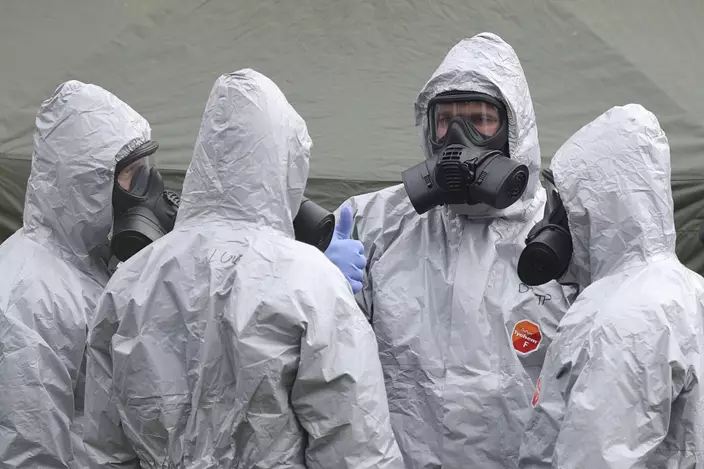
Military personnel in College Street Car Park in Salisbury, Sunday March 11, 2018, as police and members of the armed forces probe the suspected nerve agent attack on Russian double agent Sergei Skripal, which took place on Sunday March 4. (Andrew Matthews/PA via AP)
The British motive? "Simply in order to feed their Russophobia," Kiselev posited.
Kiselev's weekly show on state-owned TV channel Rossiya-1, a mixture of admiring coverage of President Vladimir Putin and insinuations of Western deviousness and incompetence, is regarded here primarily as a voice of the Kremlin.
His segment about Skripal was in sync with a reflexive response of Russian officials to attribute nearly all criticism from the West to anti-Russia bias. The sense of Russia as the target of prejudice that unscrupulous politicians work to cultivate is a key element of Putin's popularity as he seeks a fourth term in a March 4 election.
Former special services agent Mikhail Lyubimov was quoted in Komsomolskaya Pravda, one of Russia's most popular newspapers, as suggesting Skripal wouldn't have been worth the trouble of a hit.
"Skripal was sent to the West in a swap; that means he's absolutely uninteresting to us. He's a small-fry," Lyubimov said.
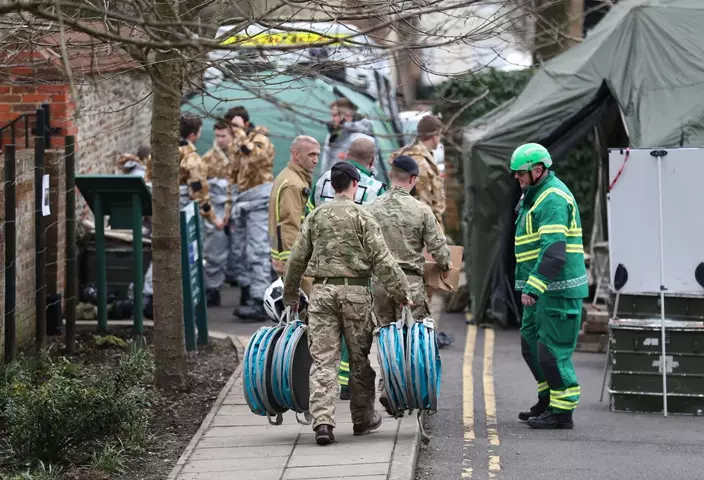
Military and emergency services personnel outside Bourne Hill police station in Salisbury, England, as police and members of the armed forces probe the suspected nerve agent attack on Russian double agent spy Sergei Skripal, Sunday March 11, 2018. (Andrew Matthews/PA via AP)
Komsomolskaya Pravda struck an almost facetious tone in the story.
"In Foggy Albion, the latest spy scandal with anti-Russian tones has ripened," it began. The article included a colorful Russian idiom for unfair accusations in a line that read, "It's obvious that, following the old tradition, all dogs will be hung on Moscow."
Russian media aimed at foreign readers have adopted the same tone of resentment and mockery as news outlets for domestic audiences.
"The British are well-known for their dramatic flair when it comes to stories of Cold War espionage and murder mystery. Think Ian Fleming, John Le Carre and Agatha Christie," said a commentary on Sputnik News, a state-run English-language news site.
"But this week's episode of a former Russian spy being poisoned on a public park bench in a quaint English town has suspiciously a tad too much drama about it."
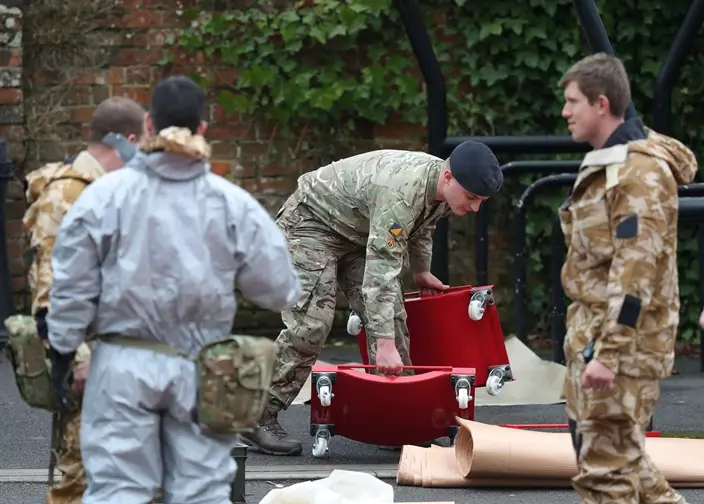
Military personnel outside Bourne Hill police station in Salisbury, England, as police and members of the armed forces probe the suspected nerve agent attack on Russian double agent spy Sergei Skripal, Sunday March 11, 2018. (Andrew Matthews/PA via AP)
On Sunday, Kiselev suggested a possible connection between the poisonings in Salisbury, which British officials said resulted from exposure to an unspecified nerve agent, and international soccer's upcoming World Cup tournament. Russia winning the right to host the competition that runs from mid-June until mid-July is one of the accomplishments Putin can point to in his re-election campaign.
Kiselev suggested the poisoning could be a "special operation" aimed at justifying a boycott of the tournament.
Skripal wasn't much use to Britain as an exposed ex-spy, but "as someone who's been poisoned, who is ill, he's very useful," Kiselev said.
The program included an on-the-ground report from Britain. The reporter noted that Salisbury, the town where Skripal was lived and fell sick, is about a 20-minute drive from the Porton Down laboratories where Britain developed chemical and bacteriological agents.
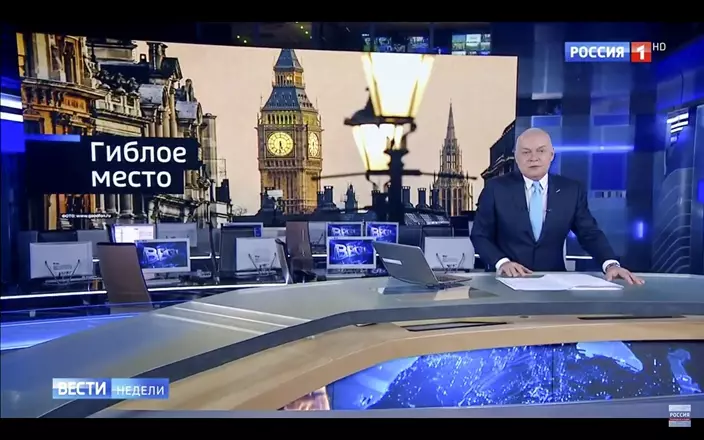
In this video grab provided by RU-RTR Russian television on Sunday, March 11, 2018, Dimtry Kiselev, one of Russia's most powerful media figures, speaks during his Sunday news program on state-owned TV channel Rossiya-1, in Moscow, Russia. (RU-RTR Russian Television via AP)
"But in the British press and special services, there is no suspicion" of any British involvement, said reporter Alexander Khabarov.
On another state television station, Channel One, anchorman Kirill Klemeinov began a report on the case balefully. He had a public service warning, Klemeinov said, for anyone who dreamed of a career that followed in Skripal's footsteps.
"The profession of a traitor is one of the most dangerous in the world," he said. "It's very rare that those who chose it have lived in peace until a ripe old age.
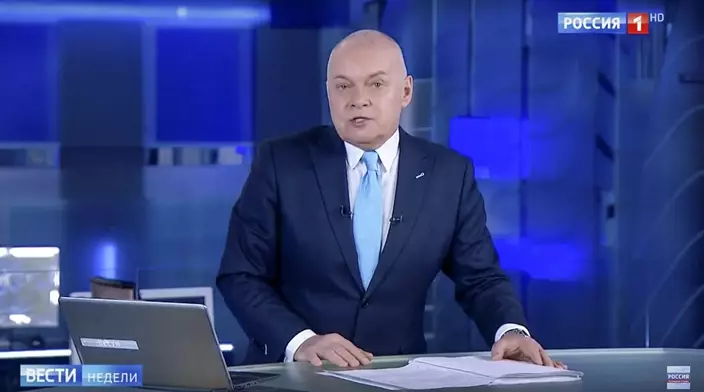
In this video grab provided by RU-RTR Russian television on Sunday, March 11, 2018, Dimtry Kiselev, one of Russia's most powerful media figures, speaks during his Sunday news program on state-owned TV channel Rossiya-1, in Moscow, Russia.(RU-RTR Russian Television via AP)
"Alcoholism, drug addiction, stress and depression are inevitable professional illnesses of a traitor, resulting in heart attacks and even suicide," Klemeinov said.
CAPRI, Italy (AP) — Top NATO and European Union officials urged foreign ministers from leading industrialized nations on Thursday to take quick, concrete steps to provide more air defense systems and artillery to Ukraine, warning that continued delays could tilt the war in Moscow’s favor.
NATO Secretary General Jens Stoltenberg and EU foreign policy chief Josep Borrell addressed a meeting of foreign ministers of G7 nations meeting on the Italian resort island of Capri. Russia’s war on Ukraine and surging tensions in the Middle East over Iran’s unprecedented attack on Israel over the weekend have topped the agenda of the gathering.
Without more Patriot air defense missile systems to protect against Russian strikes, “the electricity system of Ukraine will be destroyed. And no country can fight without having electricity at home, in the factories, in the front line,” Borrell told reporters on the sidelines of the event.
Stoltenberg welcomed signs that the U.S. Congress might soon vote on a $61 billion aid package for Ukraine, the bulk of which would go to purchasing weapons and ammunitions from U.S. defense manufacturers. And he welcomed other recent financial pledges from the Netherlands and Denmark as well as Germany's recent announced delivery of a new Patriot missile battery.
But he said more long-term and sustainable aid was necessary to better coordinate Ukraine's response over the long term.
“There is an urgent, critical need for more air defense,” Stoltenberg said, adding that artillery rounds were also needed. “We cannot continue to be in a situation where Russia is outgunning Ukraine, in the way they do now. The Russians are shooting and shooting, and the Ukrainians have limited resources to shoot back. So the Ukrainians need more, and that’s the urgent and important message from me to all allies.”
Italian Foreign Minister Antonio Tajani opened the first working session by calling for new sanctions against Iran for its weekend attack and concrete help for Ukraine. “If Ukraine loses, (Russian President Vladimir) Putin will never sit at the peace table,” Tajani warned.
The Capri meeting of the top diplomats from Britain, Canada, France, Germany, Italy, Japan and the United States dovetailed with other regional diplomatic efforts sending the same messages. On Wednesday, EU leaders meeting in Brussels vowed to ramp up sanctions on Iran to target its drone and missile deliveries to proxies in Gaza, Yemen and Lebanon.
The U.S. and Britain, meanwhile, announced Thursday they were imposing a new round of sanctions on Iran, with the U.S. targeting individuals and entities that produce engines that power drones and are involved in steel production. The latest British measures target several Iranian military organizations, individuals and entities involved in Iran’s drone and ballistic missile industries.
Borrell said the existing EU sanctions regime would be strengthened and expanded to punish Tehran and help prevent future attacks on Israel. At the same time, he said, Israel needed to exercise restraint.
“I don’t want to exaggerate but we are on the edge of a war, a regional war in the Middle East, which will be sending shockwaves to the rest of the world, and in particular to Europe,” he warned. “So stop it.”
German Foreign Minister Annalena Baerbock said Iran must be isolated “because,of course, there must be a reaction to this unprecedented incident, but there must be no further escalation in the region,” German news agency dpa reported.
On Ukraine, its Foreign Minister Dmytro Kuleba, who was invited to Capri as a guest, underlined his country’s need for essential military support, including artillery, ammunition, and air defense systems as Russia pushes along the front line.
He thanked Germany for providing Ukraine with a new Patriot battery, which was announced over the weekend, but urged the U.S. Congress to quickly approve the funding package.
“So we will work here at the ministerial level to make other allies deliver air defense systems to Ukraine. Because it’s of fundamental importance," Kuleba said.
President Joe Biden said Wednesday he supported a proposal from the House speaker, Mike Johnson, to provide about $61 billion in aid for Ukraine, signaling bipartisan support for the precarious funding bill.
U.S. Secretary of State Antony Blinken said he hoped the U.S. funding would come through but said other allies needed to step up.
“In this moment, it is urgent that all of the friends and supporters of Ukraine maximize their efforts to provide Ukraine with what it needs to continue to effectively defend itself against this Russian aggression,” Blinken said after meeting with Kuleba.
“If Putin is allowed to proceed with impunity, we know he won’t stop at Ukraine and we can safely predict that his aggression will continue,” Blinken said. “Other would-be aggressors around the world will take note and unleash their own aggressions. And we will have a world of conflict, not a world of peace and security.”
Borrell said Europe can't rely solely on Washington to help Ukraine defend itself.
“Concrete decisions have to be taken in order to send to Ukraine more air defense,” he said. “We do have Patriots, we have anti-missile systems. We have to take them from the our barracks where they are just in case, and to send to Ukraine where the war is raging. And I’m sure we will be doing that, but it has to be done quickly.”
Geir Moulson contributed from Berlin.
Follow the AP’s coverage of the war at https://apnews.com/hub/russia-ukraine
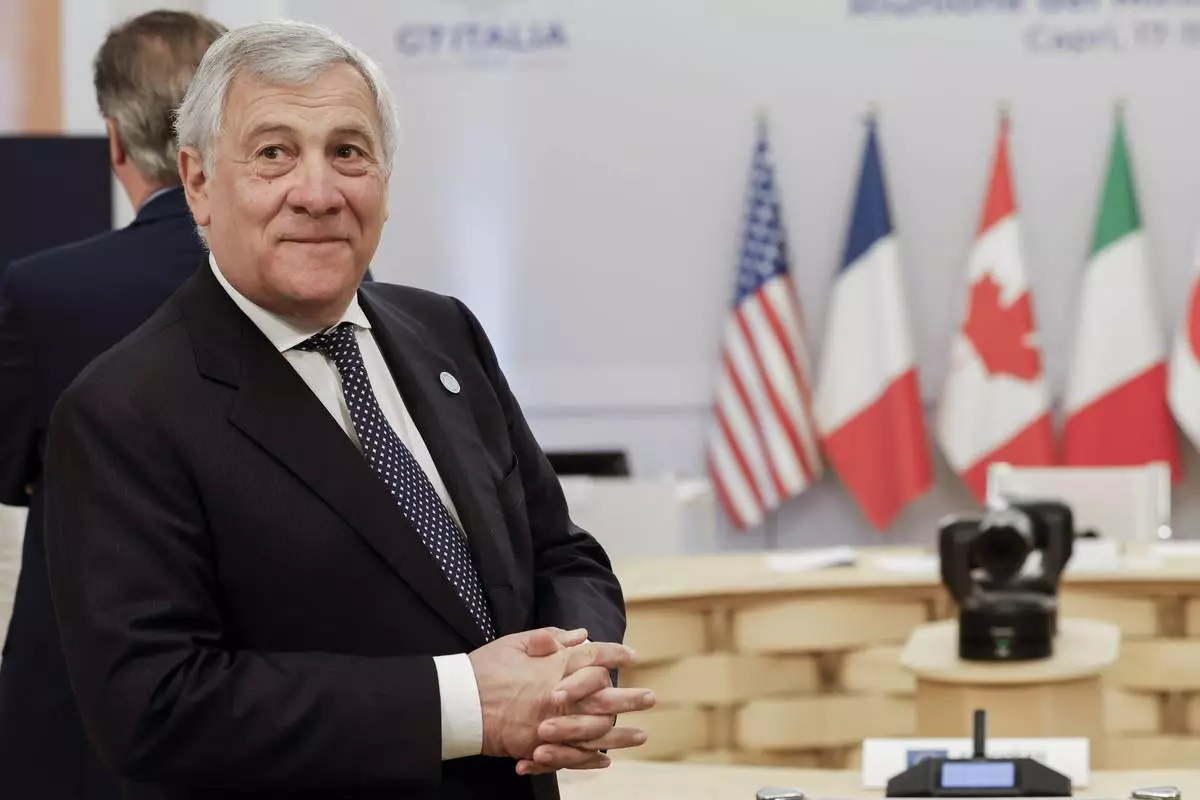
Italian Foreign Minister Antonio Tajani attends a meeting on the second day of a G7 foreign ministers meeting on Capri island, Italy, Thursday April 18, 2024. (Remo Casilli/Pool via AP)
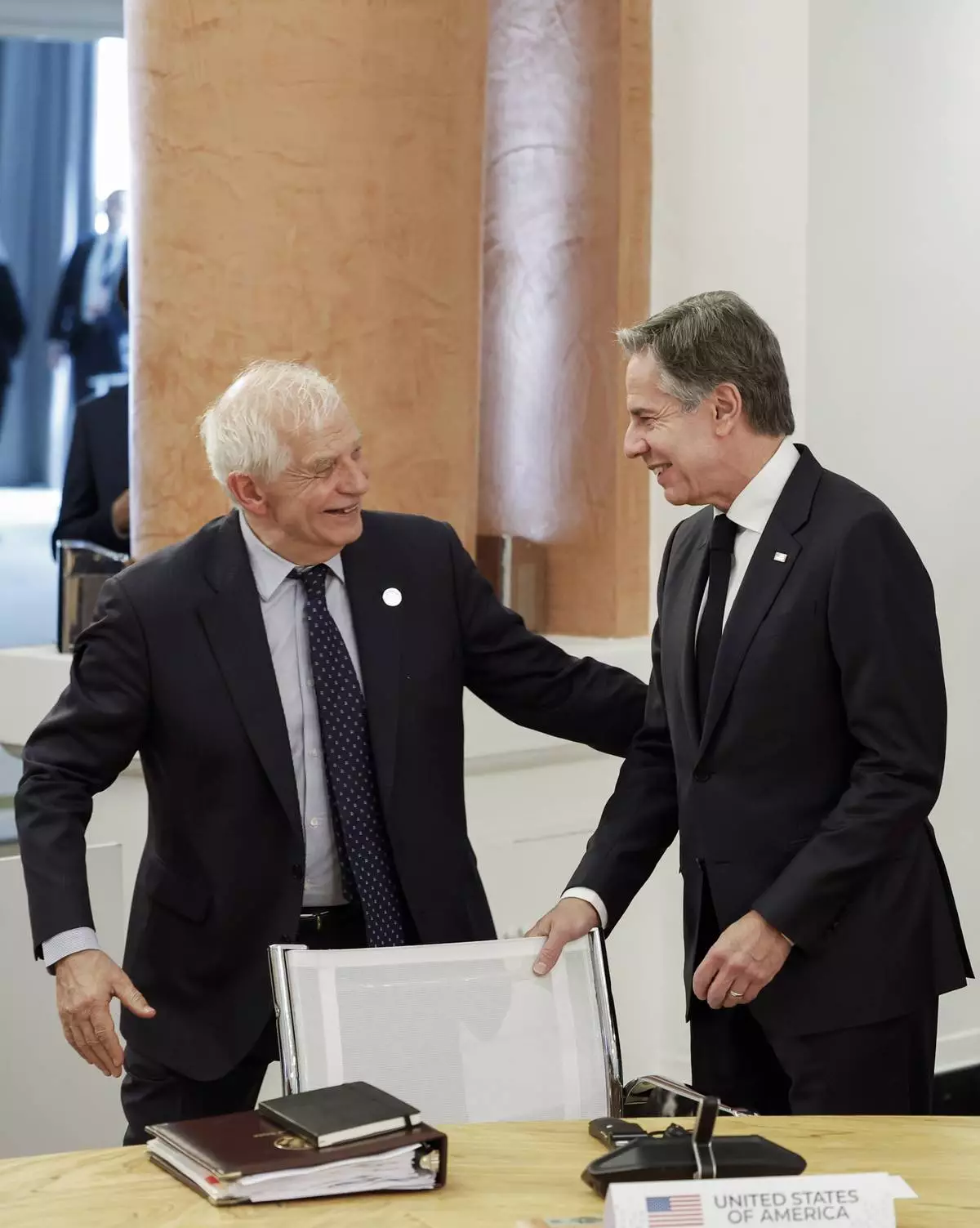
European Union foreign policy chief Josep Borrell, left, and U.S. Secretary of State Antony Blinken attend a meeting on the second day of a G7 foreign ministers meeting on Capri island, Italy, Thursday April 18, 2024. (Remo Casilli/Pool via AP)
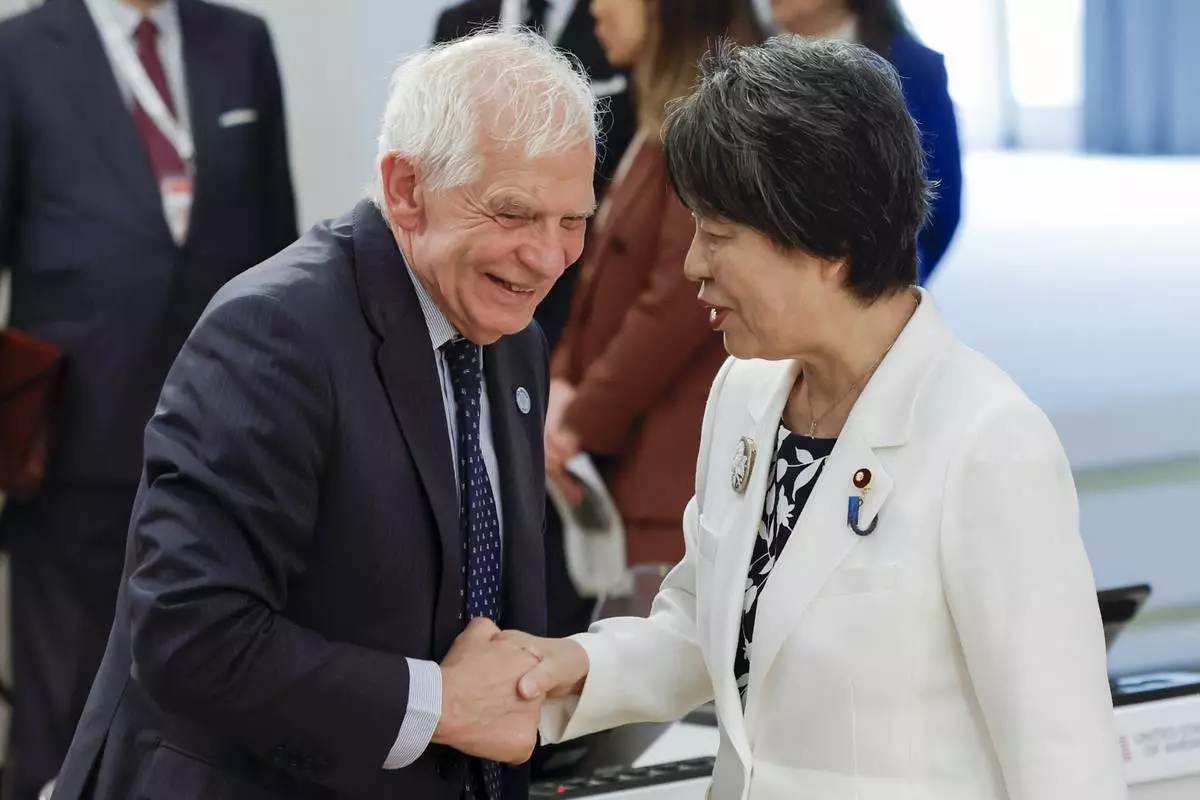
European Union foreign policy chief Josep Borrell, left, and Japanese Foreign Minister Yoko Kamikawa shake hands at a meeting on the second day of a G7 foreign ministers meeting on Capri island, Italy, Thursday April 18, 2024. (Remo Casilli/Pool via AP)
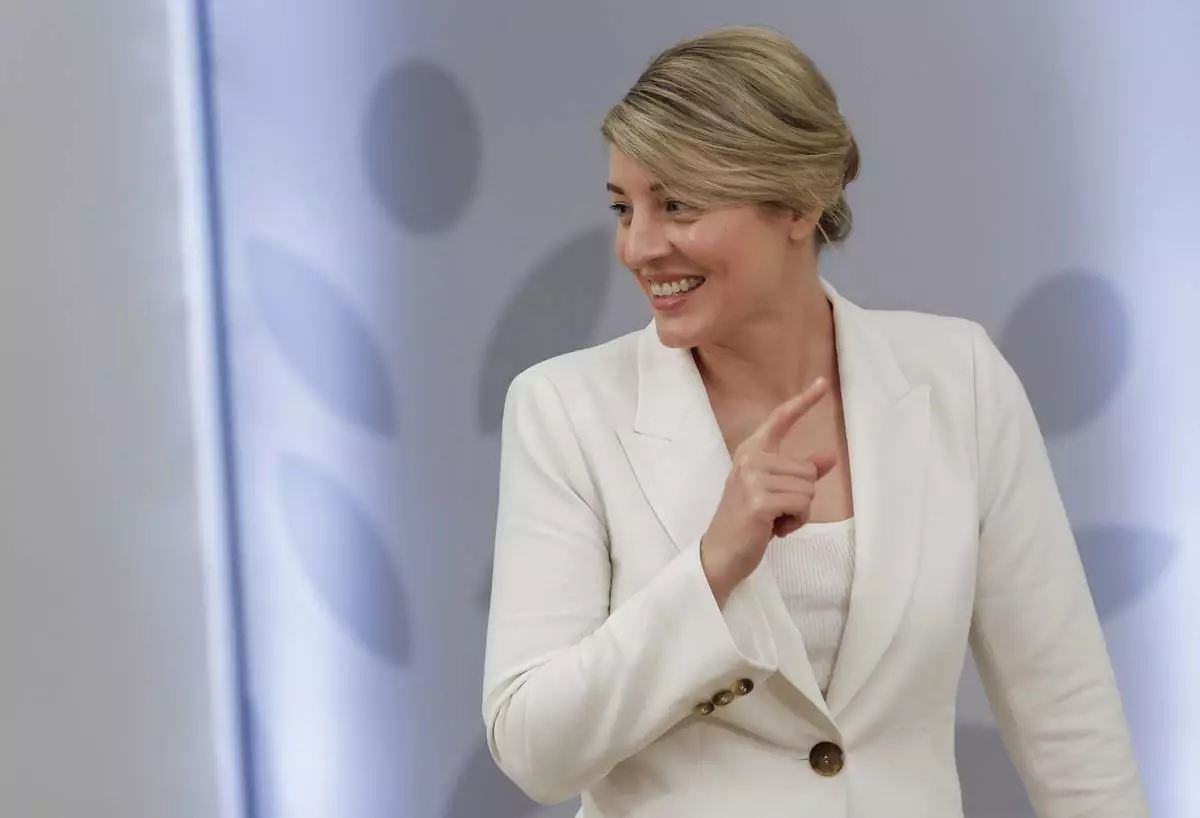
Canadian Minister of Foreign Affairs Melanie Joly attends a meeting on the second day of a G7 foreign ministers meeting on Capri island, Italy, Thursday April 18, 2024. (Remo Casilli/Pool via AP)
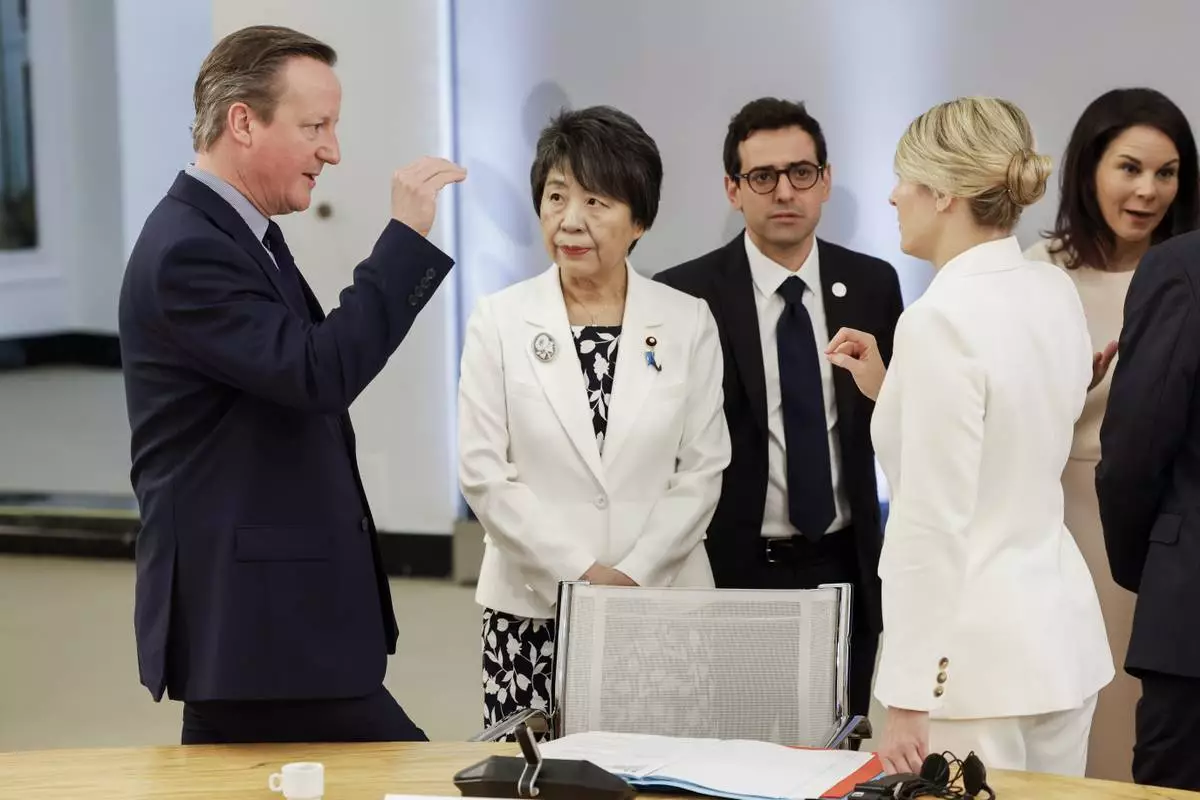
From left, British Foreign Secretary David Cameron, Japanese Foreign Minister Yoko Kamikawa, French Foreign Minister Stephane Sejourne, Canadian Minister of Foreign Affairs Melanie Joly and German Foreign Minister Annalena Baerbock attend a meeting on the second day of a G7 foreign ministers meeting on Capri island, Italy, Thursday April 18, 2024. (Remo Casilli/Pool via AP)
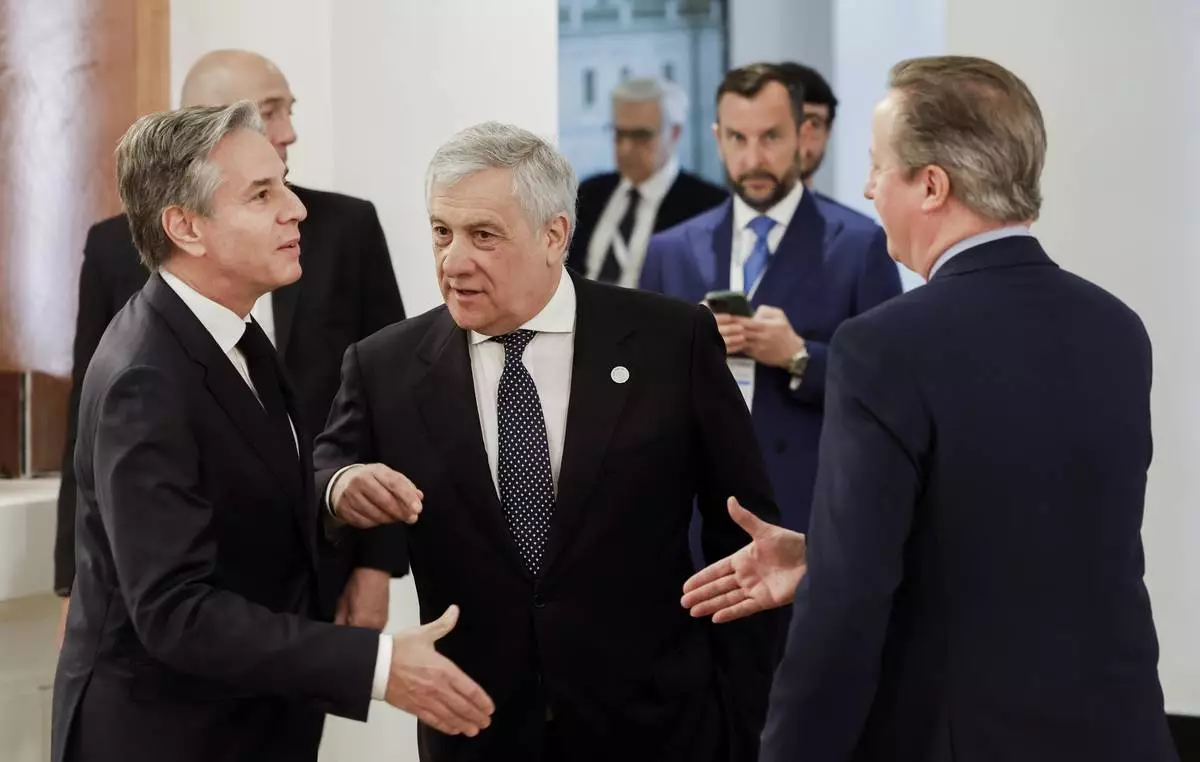
From left, U.S. Secretary of State Antony Blinken, Italian Foreign Minister Antonio Tajani and British Foreign Secretary David Cameron attend a meeting on the second day of a G7 foreign ministers meeting on Capri island, Italy, Thursday April 18, 2024. (Remo Casilli/Pool via AP)
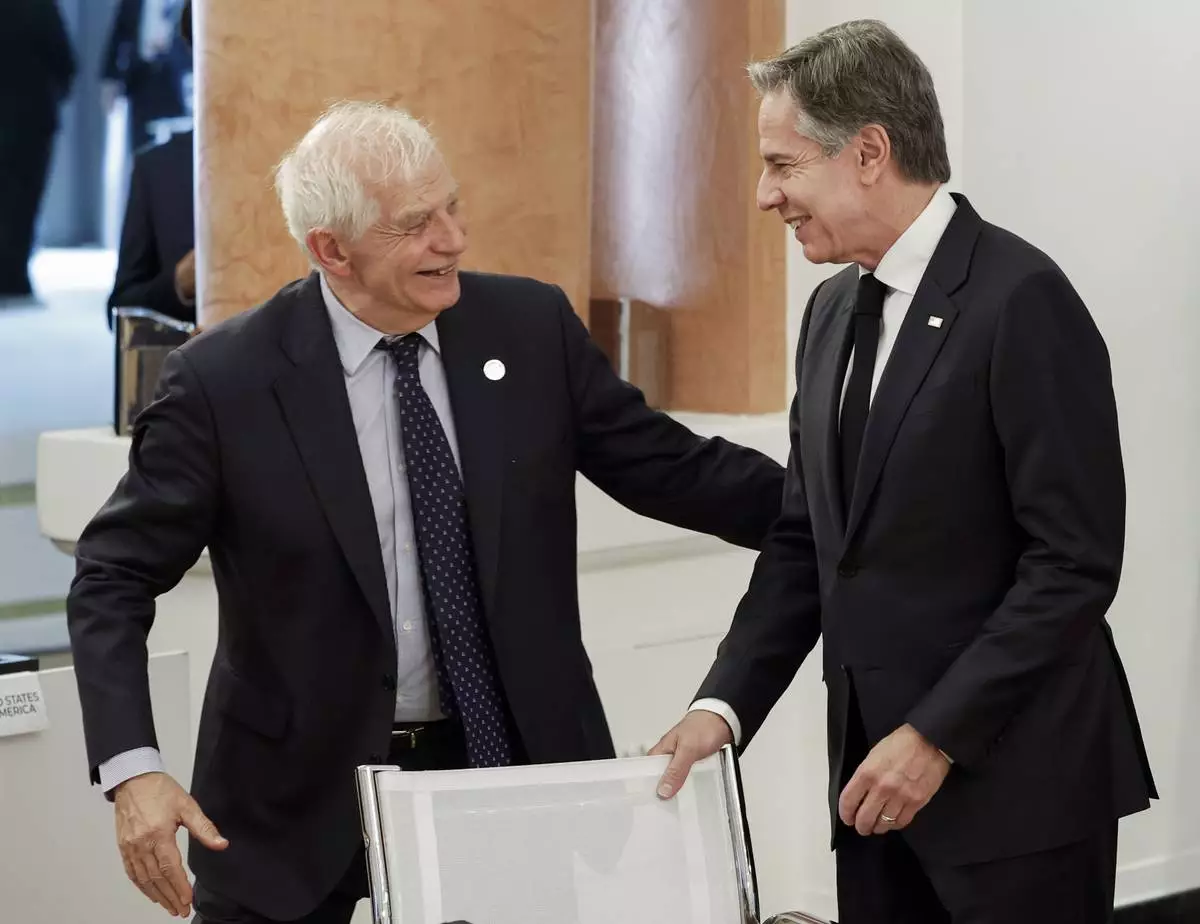
European Union foreign policy chief Josep Borrell and U.S. Secretary of State Antony Blinken, right, attend a meeting on the second day of a G7 foreign ministers meeting on Capri island, Italy, Thursday April 18, 2024. (Remo Casilli/Pool via AP)
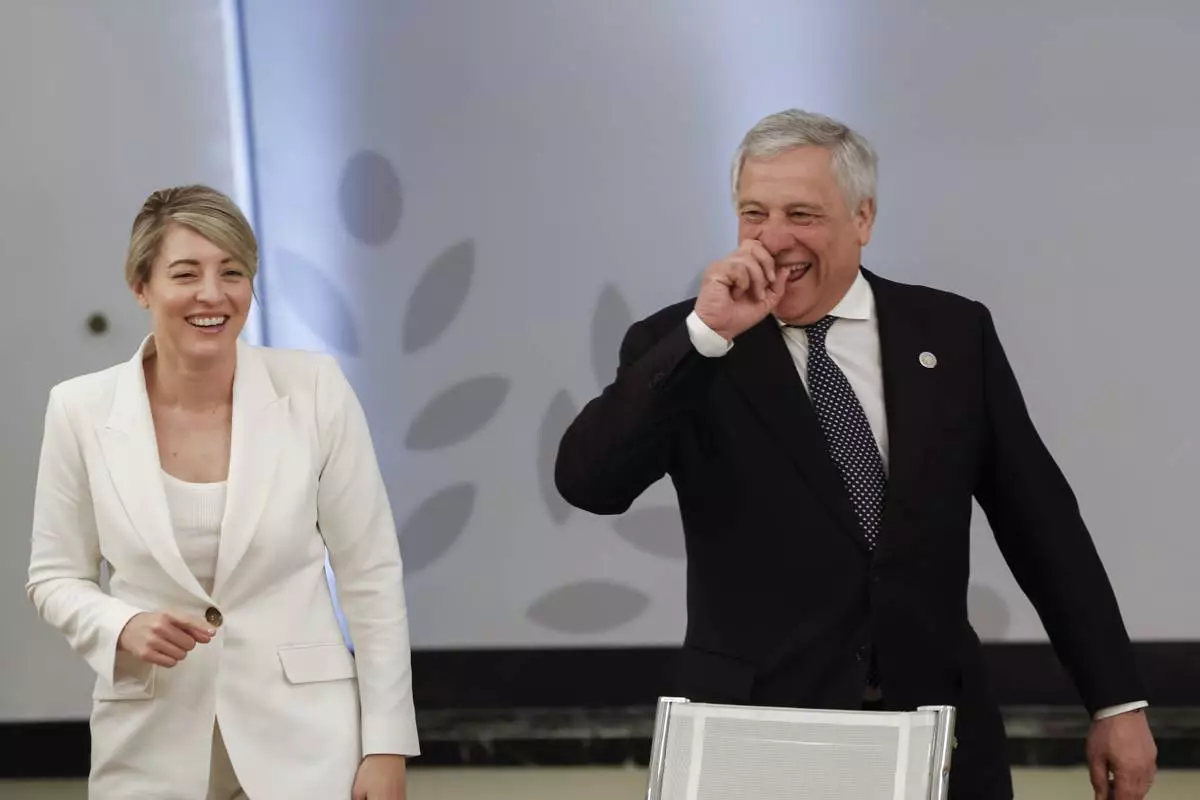
Canadian Minister of Foreign Affairs Melanie Joly, left, and Italian Foreign Minister Antonio Tajani react during a meeting on the second day of a G7 foreign ministers meeting on Capri island, Italy, Thursday April 18, 2024. (Remo Casilli/Pool via AP)
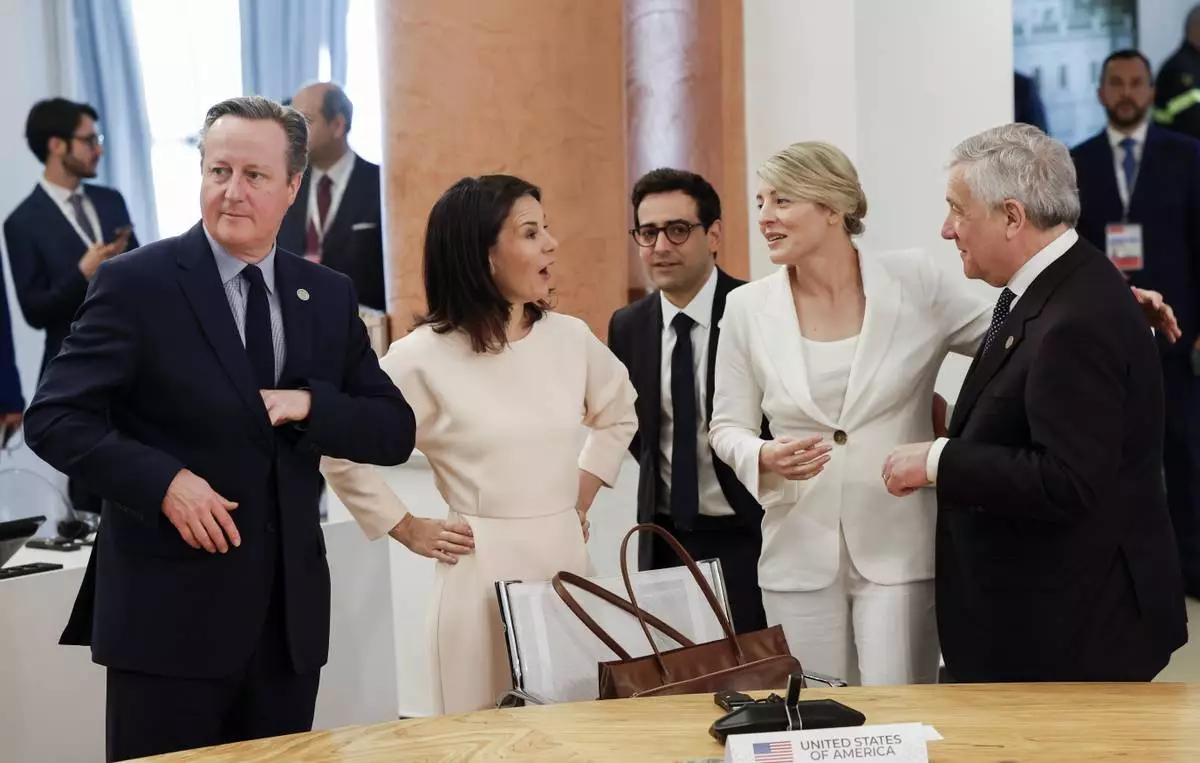
From left, British Foreign Secretary David Cameron, German Foreign Minister Annalena Baerbock, French Foreign Minister Stephane Sejourne, Canadian Minister of Foreign Affairs Melanie Joly and Italian Foreign Minister Antonio Tajani attend a meeting on the second day of a G7 foreign ministers meeting on Capri island, Italy, Thursday April 18, 2024. (Remo Casilli/Pool via AP)
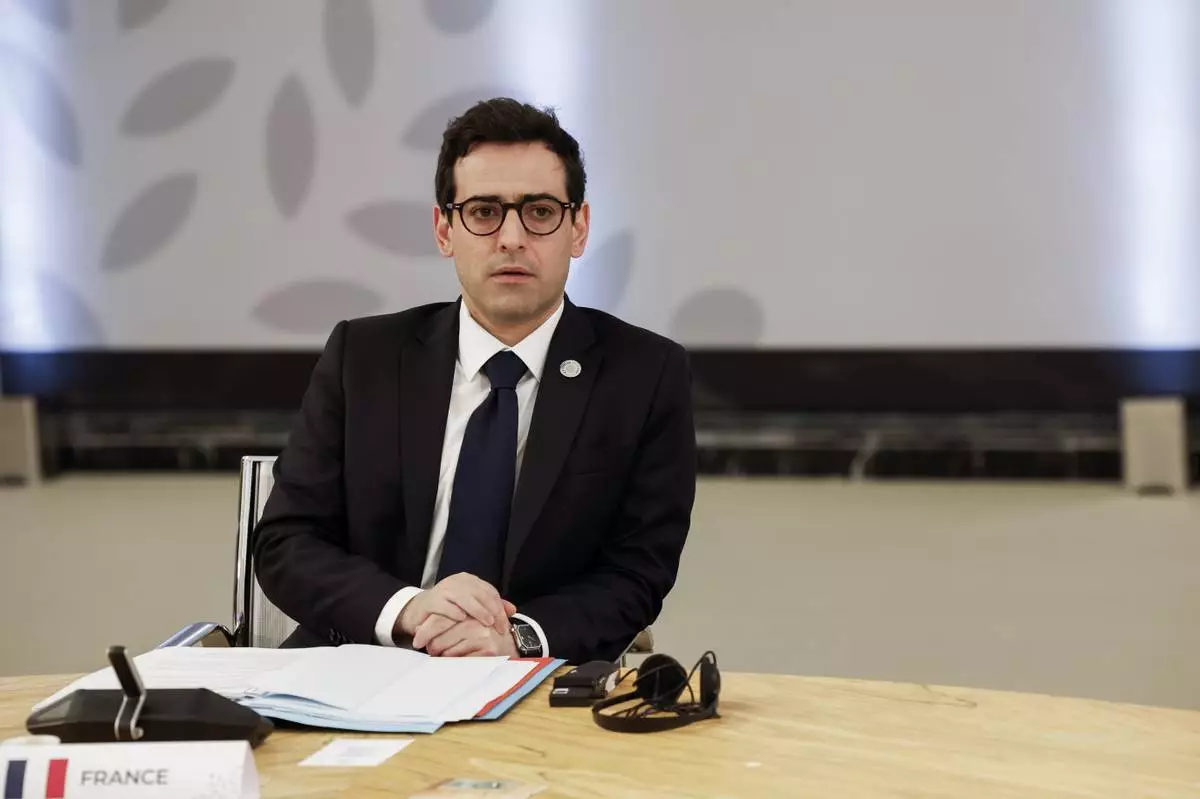
French Foreign Minister Stephane Sejourne attends a meeting on the second day of a G7 foreign ministers meeting on Capri island, Italy, Thursday April 18, 2024. (Remo Casilli/Pool via AP)
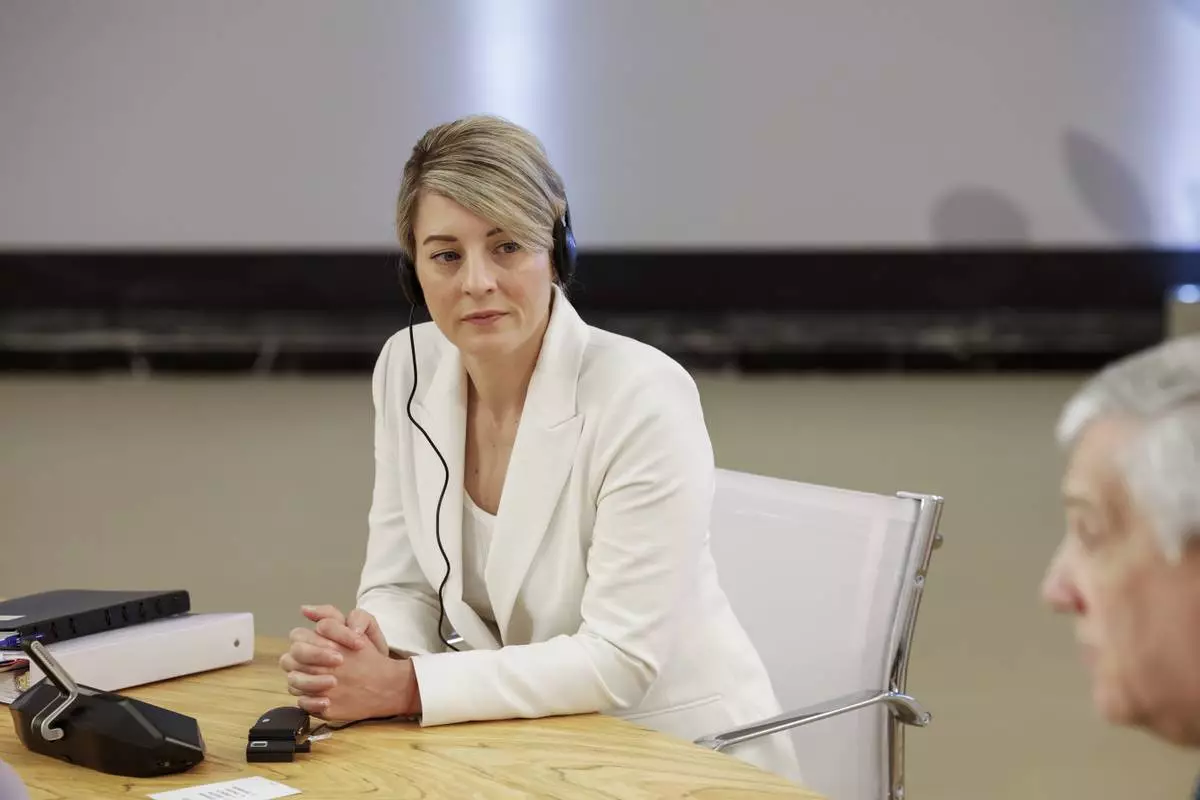
Canadian Minister of Foreign Affairs Melanie Joly attends a meeting on the second day of a G7 foreign ministers meeting on Capri island, Italy, Thursday April 18, 2024. (Remo Casilli/Pool via AP)
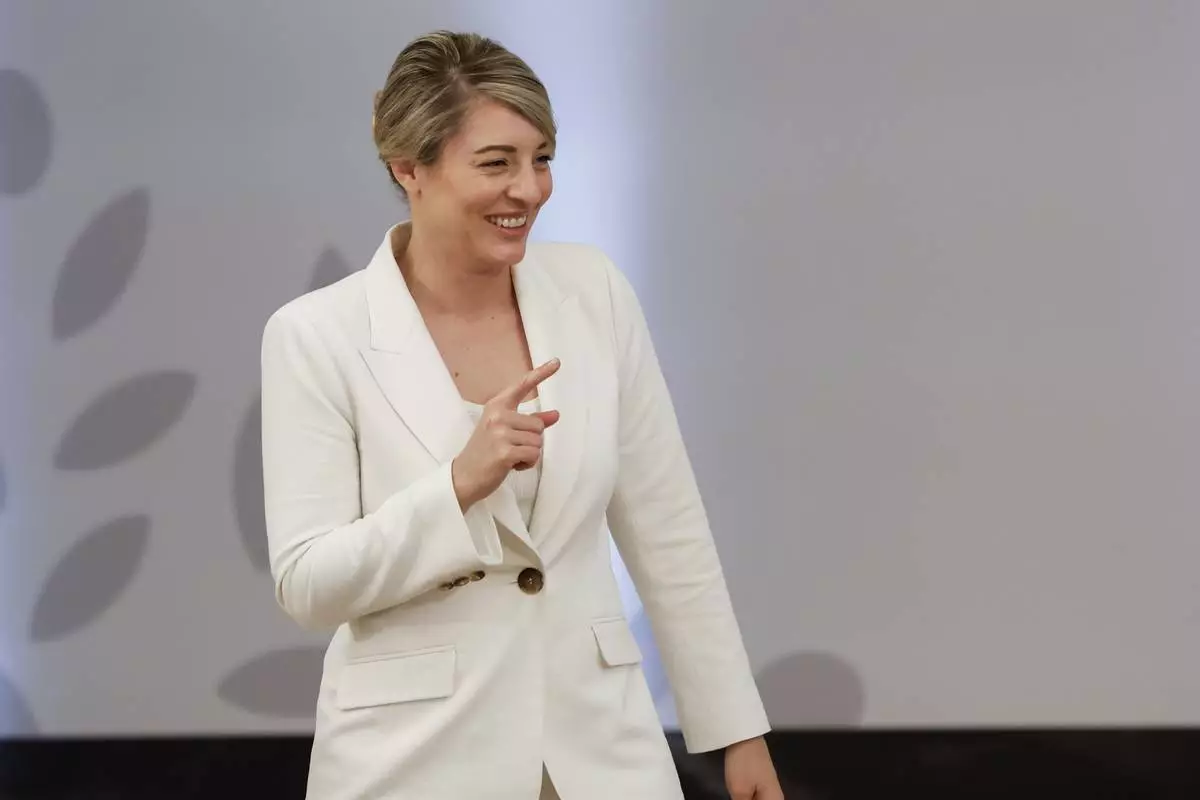
Canadian Minister of Foreign Affairs Melanie Joly attends a meeting on the second day of a G7 foreign ministers meeting on Capri island, Italy, Thursday April 18, 2024. (Remo Casilli/Pool via AP)
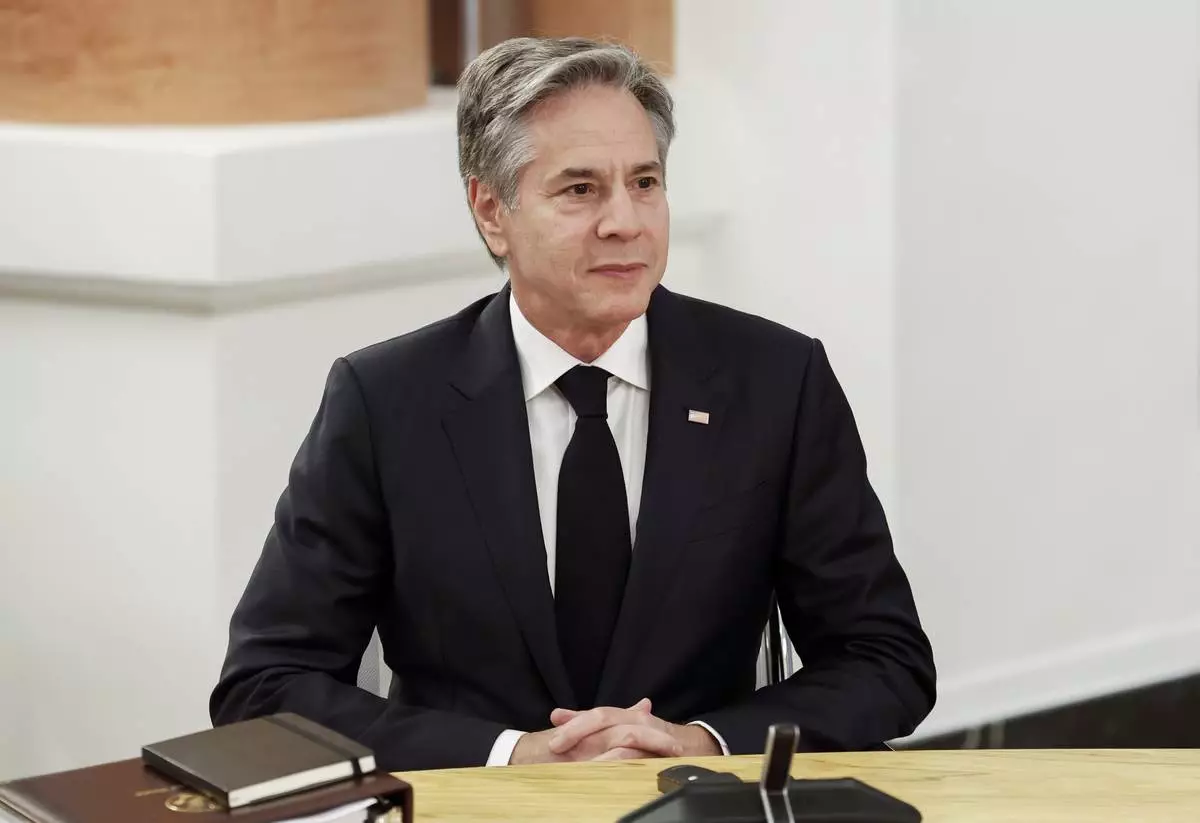
U.S. Secretary of State Antony Blinken attends a meeting on the second day of a G7 foreign ministers meeting on Capri island, Italy, Thursday April 18, 2024. (Remo Casilli/Pool via AP)
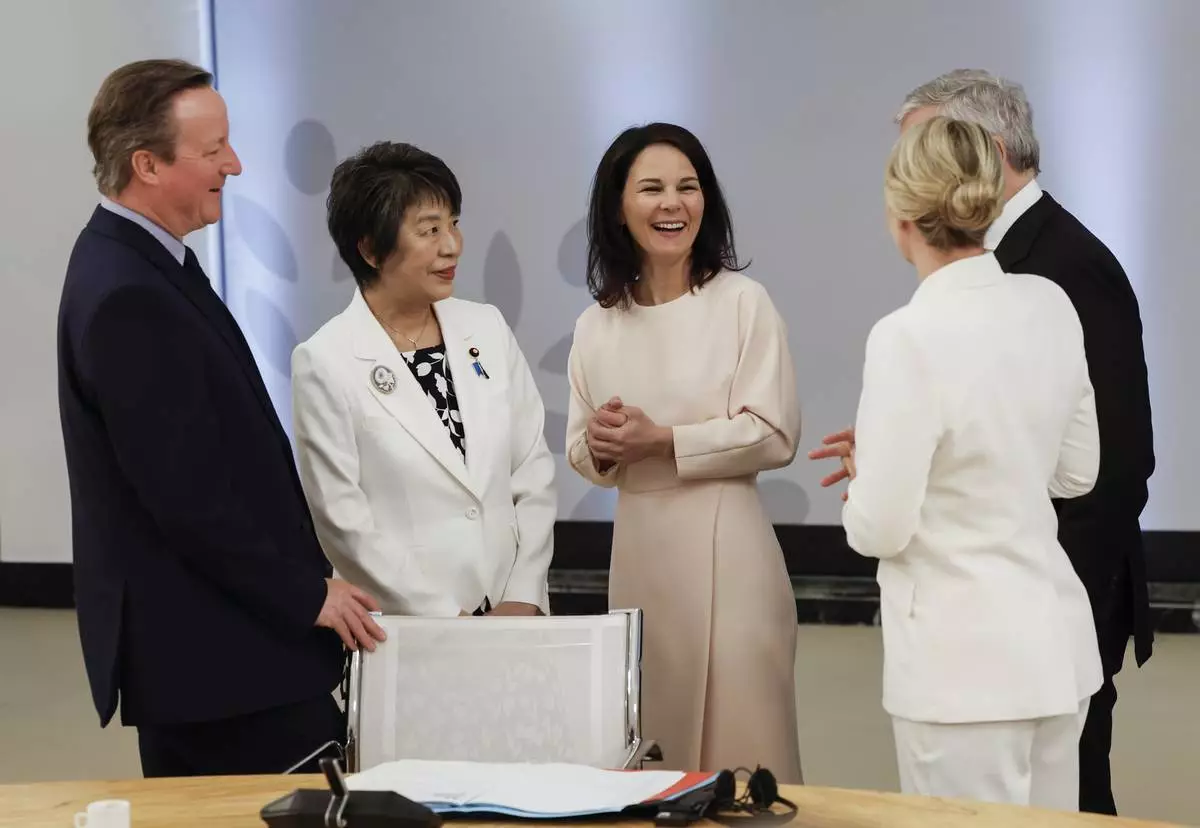
From left, British Foreign Secretary David Cameron, Japanese Foreign Minister Yoko Kamikawa, German Foreign Minister Annalena Baerbock, Canadian Minister of Foreign Affairs Melanie Joly and Italian Foreign Minister Antonio Tajani speak during a meeting on the second day of a G7 foreign ministers meeting on Capri island, Italy, Thursday April 18, 2024. (Remo Casilli/Pool via AP)
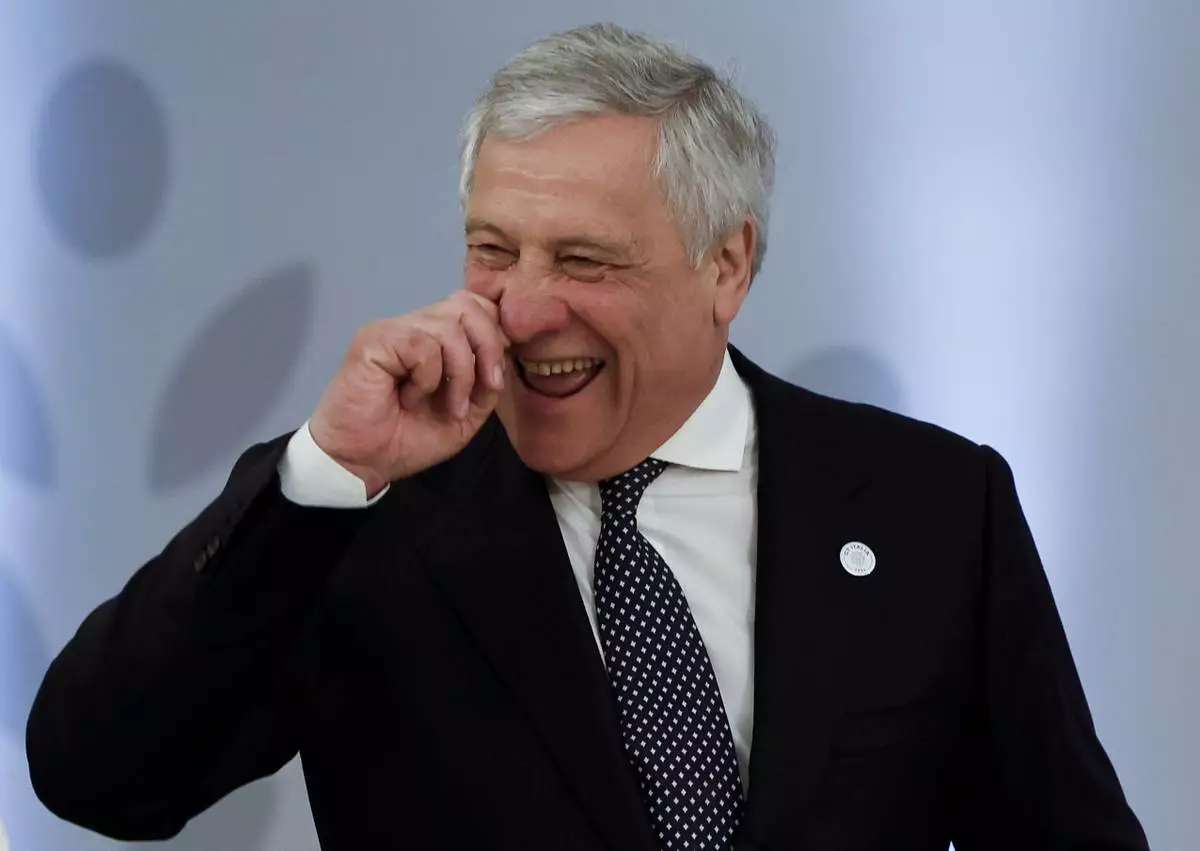
Italian Foreign Minister Antonio Tajani reacts during a meeting on the second day of a G7 foreign ministers meeting on Capri island, Italy, Thursday April 18, 2024. (Remo Casilli/Pool via AP)
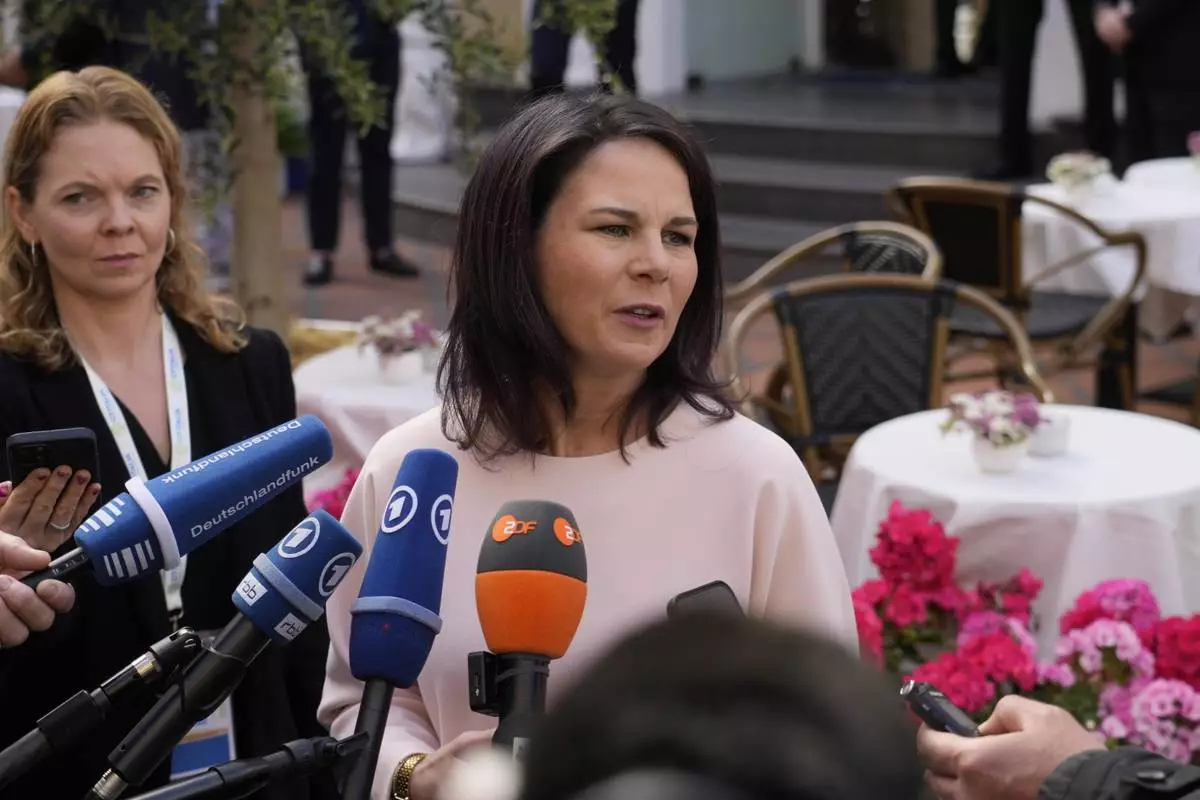
German Foreign Minister Annalena Baerbock talks to reporters during the G7 Foreign Ministers meeting on Capri Island, Italy, Thursday, April 18, 2024. (AP Photo/Gregorio Borgia)
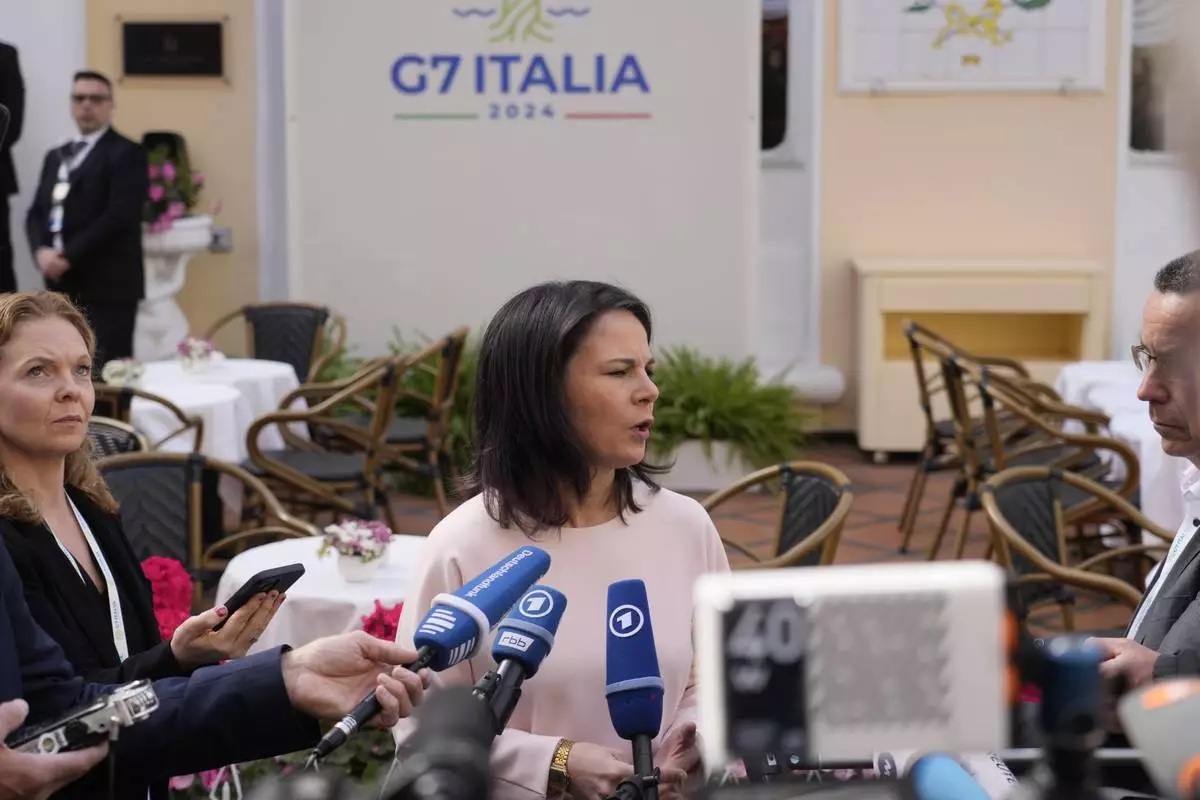
German Foreign Minister Annalena Baerbock talks to reporters during the G7 Foreign Ministers meeting on Capri Island, Italy, Thursday, April 18, 2024. (AP Photo/Gregorio Borgia)
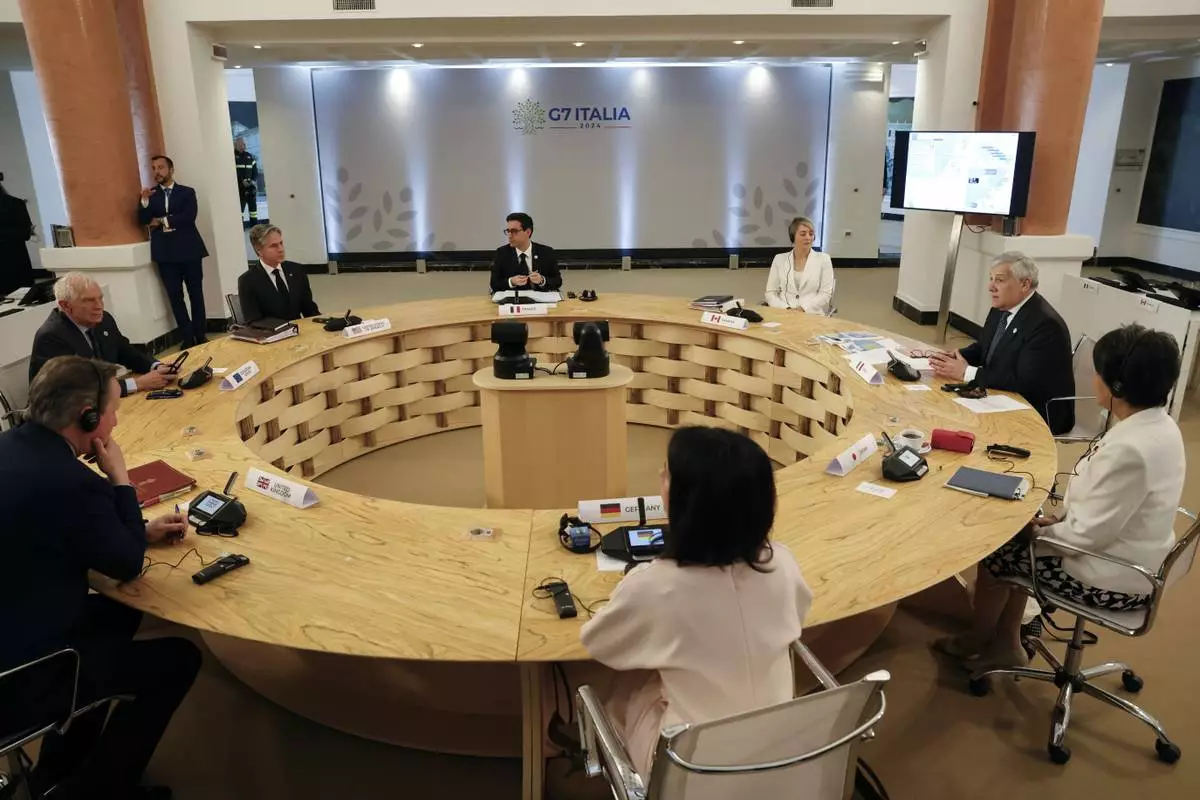
British Foreign Secretary David Cameron, down left, European Union foreign policy chief Josep Borrell, left, U.S. Secretary of State Antony Blinken, top left, German Foreign Minister Annalena Baerbock, bottom, Japanese Foreign Minister Yoko Kamikawa, right, Canadian Minister of Foreign Affairs Melanie Joly, top right, French Foreign Minister Stephane Sejourne, top, and Italian Foreign Minister Antonio Tajani meet on the second day of a G7 foreign ministers meeting on Capri island, Italy, Thursday April 18, 2024. (Remo Casilli/Pool via AP)
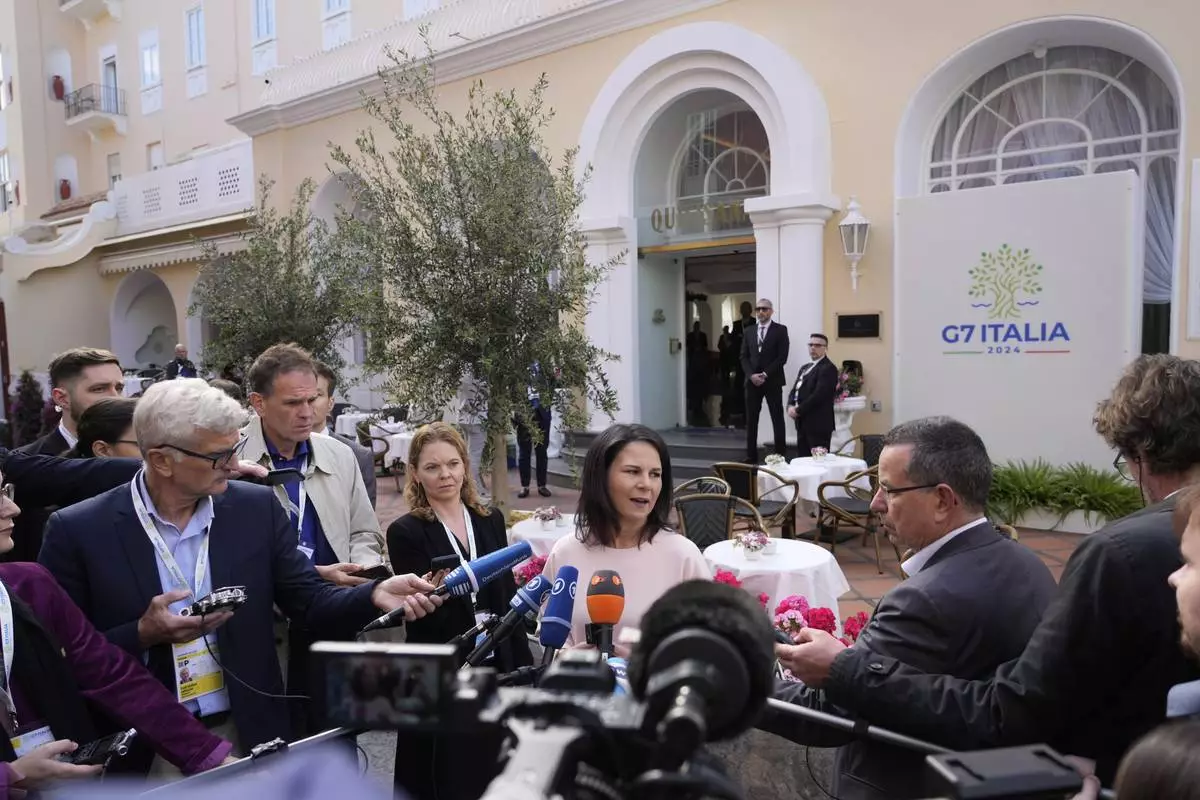
German Foreign Minister Annalena Baerbock talks to reporters during the G7 Foreign Ministers meeting on Capri Island, Italy, Thursday, April 18, 2024. (AP Photo/Gregorio Borgia)
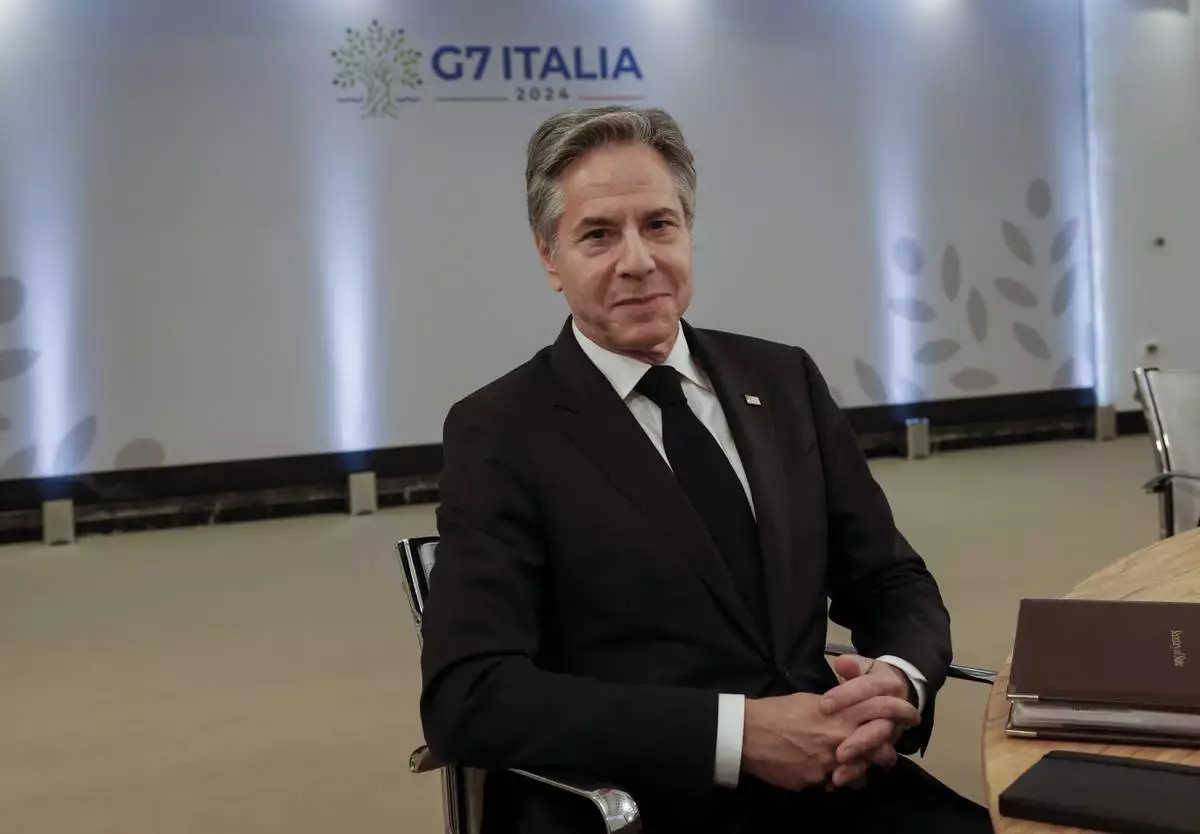
U.S. Secretary of State Antony Blinken attends a meeting on the second day of a G7 foreign ministers meeting on Capri island, Italy, Thursday April 18, 2024. (Remo Casilli/Pool via AP)
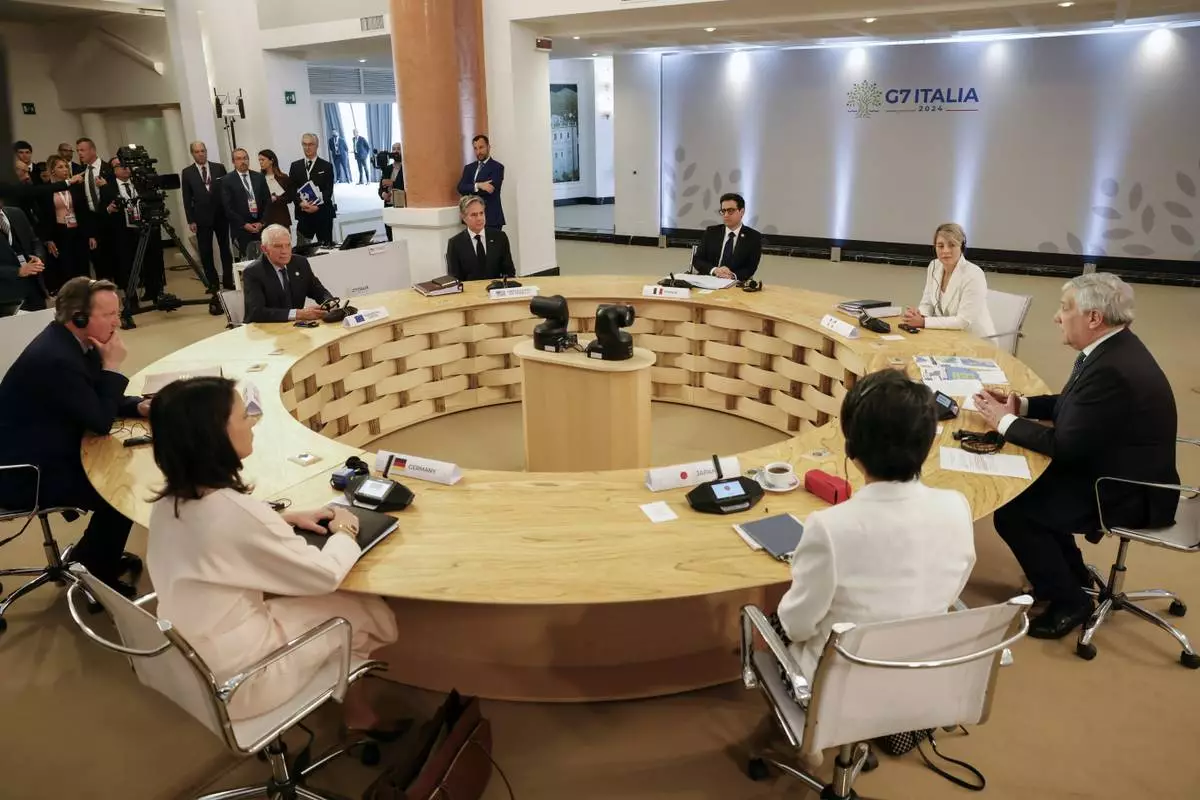
British Foreign Secretary David Cameron, left, European Union foreign policy chief Josep Borrell, top left, U.S. Secretary of State Antony Blinken, top, second from left, German Foreign Minister Annalena Baerbock, bottom left, Japanese Foreign Minister Yoko Kamikawa, bottom right, Canadian Minister of Foreign Affairs Melanie Joly, top right, French Foreign Minister Stephane Sejourne and Italian Foreign Minister Antonio Tajani, right, meet on the second day of a G7 foreign ministers meeting on Capri island, Italy, Thursday April 18, 2024. (Remo Casilli/Pool via AP)






























